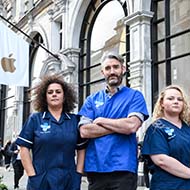Brands urged to #EndTheTrend of brachycephalic pets

Vets from leading pet charity, Blue Cross, call for top Brands to commit to phasing out the use of any brachycephalic pets in their future advertising as part of the charity’s #EndTheTrend campaign.
National charity Blue Cross is calling on the UK’s leading brands to phase out the use of brachycephalic, or ‘flat-faced’, pets in their advertising materials by the end of 2022.
The campaign dubbed #EndTheTrend comes in response to the soaring popularity of pugs, French bulldogs, Boston terriers, Persian cats and lionhead rabbits - all of which have appeared in nationwide advertising campaigns because of their fashionable status.
According to figures released by Blue Cross, brachycephalic dog breeds account for one-fifth of all the nation’s dogs. In the last two years alone, the organisation's vets have treated more than 5,000 brachycephalic pets for issues such as Brachycephalic Obstructive Airway Syndrome (BOAS). Enucleation and eyelid surgery, and emergency caesarian sections.
Blue Cross vet, Caroline Reay, commented: “Brachycephalic pets, like Frenchies and Pugs, have soared in popularity in recent years. With their compelling big eyes and baby-like faces, our obsession with their appearance has created an animal welfare crisis.
“As these breeds grow in popularity, there is a rise in parallel of unscrupulous breeders looking to cash in on a trend. Our veterinary hospital teams are treating more and more very unwell pets who are experiencing health complications caused by breeding for a characteristic ‘flat face’.”
She added: “Frenchies, Pugs and Persians have become the poster pets for advertising, no matter the product, and behind those cute faces can lie horrifying health problems. We call on companies to find other ways to promote their wares and help us #EndTheTrend.”
As part of the campaign, Blue Cross has produced a series of mock advertisements showing how brands are contributing to brachycephaly. The adverts feature across 10 high profile stations in London, including Charing Cross, London Bridge and St Pancras.
Blue Cross has also launched a petition which members of the public can sign to urge their favourite brands to commit to this pledge.



 The Veterinary Medicines Directorate (VMD) is inviting applications from veterinary students to attend a one-week extramural studies (EMS) placement in July 2026.
The Veterinary Medicines Directorate (VMD) is inviting applications from veterinary students to attend a one-week extramural studies (EMS) placement in July 2026.